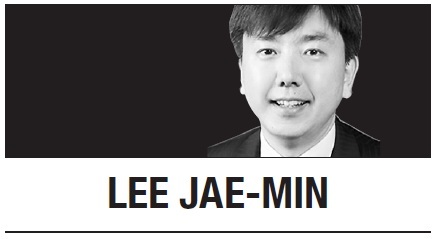[Lee Jae-min] With progress on denuclearization, economic cooperation projects ready to roll
By Lee Jae-minPublished : Sept. 18, 2018 - 17:14
 The names and faces of government officials and business leaders in the presidential entourage for this week’s third inter-Korean summit in Pyongyang send a clear message as to how serious we are about the two Koreas’ economic cooperation projects. To start with, it includes eight minister-level officials. Also joining are corporate leaders from Samsung, LG, SK, Hyundai and Posco, among others. Not only that, the CEOs of KDB, Korail and Kepco are flying North as well. With entourage members of this caliber -- the real decision makers where corporate investment and infrastructure projects are concerned -- the stage is set for serious discussions about inter-Korean economic exchange programs.
The names and faces of government officials and business leaders in the presidential entourage for this week’s third inter-Korean summit in Pyongyang send a clear message as to how serious we are about the two Koreas’ economic cooperation projects. To start with, it includes eight minister-level officials. Also joining are corporate leaders from Samsung, LG, SK, Hyundai and Posco, among others. Not only that, the CEOs of KDB, Korail and Kepco are flying North as well. With entourage members of this caliber -- the real decision makers where corporate investment and infrastructure projects are concerned -- the stage is set for serious discussions about inter-Korean economic exchange programs.Unquestionably, economic cooperation projects cannot move an inch forward as long as UN sanctions are in place. And any easing of those sanctions hinges upon a promise of, or at least some concrete action toward, denuclearization from the North. Whether that can happen this week in Pyongyang is anybody’s guess. All we can do now is hope for the best. The world and everyone here in Seoul will be all ears, hoping to hear the D-word (denuclearization) or at least the R-word (reporting) from the North Korean leader’s mouth. A meaningful promise will be able to soften the sanctions, and then tap the South’s funds and resources for mutual projects.
For its part, South Korea has been anxious to initiate economic cooperation programs. In South Korea’s mind, it is the best way -- the only way -- to engage North Korea and usher in a peace regime once and for all. From a business perspective, it has been said that the “Northern passage” will allow for a breakthrough in the sagging domestic economy. No wonder the topic has been the top priority for the government. But Seoul’s desire can become reality only if the North responds in kind with its schedule for denuclearization.
At any rate, while many things remain unclear, the heavyweight pan-South Korean economic entourage will likely exert critical influence on North Korean decision makers. They will hear, see and feel economic assistance packages and cooperation projects at their doorstep. The list of programs and projects waiting for the go-ahead signal will probably whet their appetites for concrete action on the denuclearization front. If nothing else, this visit could be a three-day “roadshow” for the North -- a showcase for future economic exchange packages for Pyongyang to see and feel. Those will serve as tangible incentives to entice Pyongyang to accept the offer on the table.
Assuming a long-awaited breakthrough is made this time or sometime soon, what will then follow are various categories of investments from public and private entities from the South. This raises the critical question of how to protect them. Last time, the basic framework was not carefully contemplated and no effective system of protection was put in place. And we all know what happened afterward. The mistakes of the South-North Investment Protection Arrangement in 2000 should not be repeated. That instrument did not set forth the necessary provisions usually found in similar documents, but instead relied too much upon goodwill and handshakes. In particular, South Korean investors lacked access to an effective dispute-settlement process. This time, too much is at stake to go down the same path.
To our surprise, North Korea also has investment protection treaties with as many as 24 countries -- the most recent having been signed with Singapore in 2008. There is no reason that key elements of those treaties could not also be incorporated into a new instrument between the two Koreas.
The pivotal three-day summit will be a turning point for the North Korean denuclearization issue, the stalled US-North Korea negotiations and inter-Korean relations. If strides are made toward denuclearization, economic cooperation projects and assistance programs will soon be in full swing. Whatever comes out of the Pyongyang meeting will be the subject of much discussion at Chuseok holiday dinner tables when families gather next week.
Lee Jae-min
Lee Jae-min is a professor of law at Seoul National University. He can be reached at jaemin@snu.ac.kr. -- Ed.








![[Today’s K-pop] BTS pop-up event to come to Seoul](http://res.heraldm.com/phpwas/restmb_idxmake.php?idx=644&simg=/content/image/2024/04/17/20240417050734_0.jpg&u=)
![[Graphic News] More Koreans say they plan long-distance trips this year](http://res.heraldm.com/phpwas/restmb_idxmake.php?idx=644&simg=/content/image/2024/04/17/20240417050828_0.gif&u=)






![[KH Explains] Hyundai's full hybrid edge to pay off amid slow transition to pure EVs](http://res.heraldm.com/phpwas/restmb_idxmake.php?idx=652&simg=/content/image/2024/04/18/20240418050645_0.jpg&u=20240419100350)

